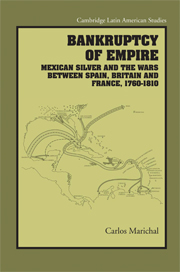Book contents
- Frontmatter
- Contents
- List of Tables and Figures
- Acknowledgements
- Introduction
- 1 Resurgence of the Spanish Empire: Bourbon Mexico as Submetropolis, 1763–1800
- 2 An Imperial Tax State: The Fiscal Rigors of Colonialism
- 3 Imperial Wars and Loans from New Spain, 1780–1800
- 4 The Royal Church and the Finances of the Viceroyalty
- 5 Napoleon and Mexican Silver, 1805–1808
- 6 Between Spain and America: The Royal Treasury and the Gordon & Murphy Consortium, 1806–1808
- 7 Mexican Silver for the Cortes of Cádiz and the War against Napoleon, 1808–1811
- 8 The Rebellion of 1810, Colonial Debts, and Bankruptcy of New Spain
- Conclusions: The Financial Collapse of Viceroyalty and Monarchy
- Appendixes
- Bibliography
- Index
- CAMBRIDGE LATIN AMERICAN STUDIES
2 - An Imperial Tax State: The Fiscal Rigors of Colonialism
Published online by Cambridge University Press: 14 July 2009
- Frontmatter
- Contents
- List of Tables and Figures
- Acknowledgements
- Introduction
- 1 Resurgence of the Spanish Empire: Bourbon Mexico as Submetropolis, 1763–1800
- 2 An Imperial Tax State: The Fiscal Rigors of Colonialism
- 3 Imperial Wars and Loans from New Spain, 1780–1800
- 4 The Royal Church and the Finances of the Viceroyalty
- 5 Napoleon and Mexican Silver, 1805–1808
- 6 Between Spain and America: The Royal Treasury and the Gordon & Murphy Consortium, 1806–1808
- 7 Mexican Silver for the Cortes of Cádiz and the War against Napoleon, 1808–1811
- 8 The Rebellion of 1810, Colonial Debts, and Bankruptcy of New Spain
- Conclusions: The Financial Collapse of Viceroyalty and Monarchy
- Appendixes
- Bibliography
- Index
- CAMBRIDGE LATIN AMERICAN STUDIES
Summary
The colonies of Spain and Portugal only have contributed any revenue towards the defense of the mother country, or the support of her civil government. The taxes which have been levied upon those of …England in particular, have seldom been equal to the expense laid out upon them in time of peace, and never sufficient to defray that which they occasioned in time of war.
Adam Smith, Wealth of Nations, IV. 7. 9.9In the summer of 1763, the British Cabinet, headed by Lord George Grenville, announced the introduction of the first of a series of new taxes in the thirteen British colonies in North America. After signing the Treaty of Paris, the British government had resolved to assure its multiple victories by increasing its standing military forces in North America, a strategy which inevitably implied considerable expenditures. According to Richard Bonney, “the need after 1763 for a permanent military establishment in the American colonies at a likely cost of some £224,000 per annum (civil administration had cost a mere £50,000) meant that new tax revenues had to be found in the colonies to meet the bill.” The fiscal innovations were soon confronted with strong protests. The rejection of the Navigation Acts, the Sugar Act, and the Stamp Act by the colonists was one of the major catalysts of revolution and of the war of independence (1776–1783) by the new United States, according to most standard historical interpretations.
- Type
- Chapter
- Information
- Bankruptcy of EmpireMexican Silver and the Wars Between Spain, Britain and France, 1760–1810, pp. 48 - 80Publisher: Cambridge University PressPrint publication year: 2007



